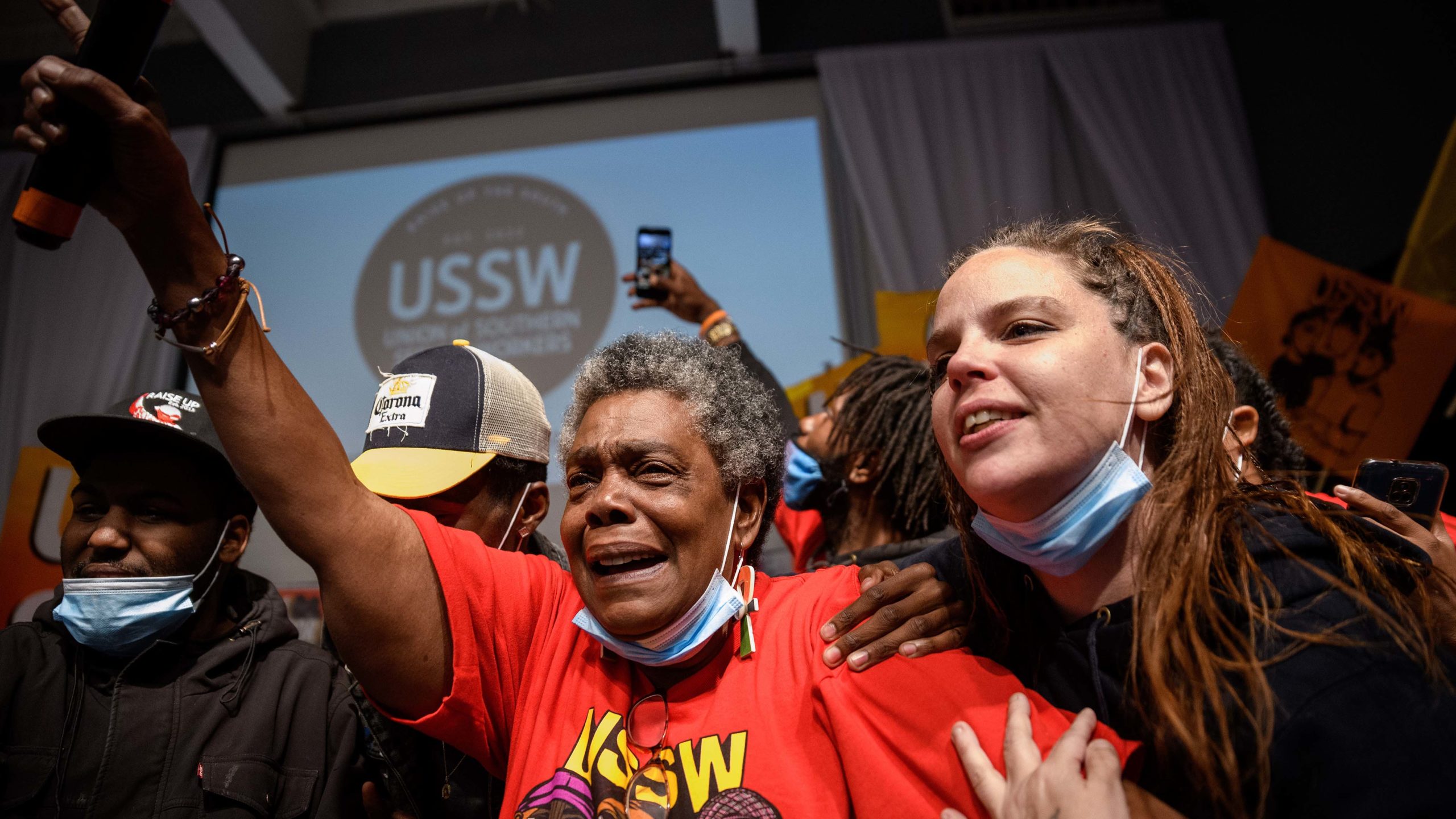On November 19, workers from a variety of low-wage sectors including retail, fast food, care, and gas station workers, gathered in Columbia, South Carolina to sign membership cards for a brand new cross-sector union: the Union of Southern Service Workers (USSW). USSW is a part of one of the largest unions in the US, the Service Employees International Union (SEIU). The demands of USSW are: a seat at the table in terms of making decisions at the workplace, fair pay, dignity and equal treatment, health and safety, and fair and consistent scheduling.
“With eyes wide open to the past and immense hope for a better future, we are building a union to fight for living wages, fair working conditions and a voice on the job,” said Brandon Beachum, a worker at a Panera Bread in Atlanta, Georgia. “We’re coming together and digging in for the long haul as a union because collective action is the best solution to improve our lives and support our families.”
One of the major goals of organizing unions in the US is for workers to have the right to decision making at their workplaces, such as on scheduling, wages, working conditions, or benefits. Worker decision-making power is virtually non-existent at non-unionized workplaces, which are some of the biggest employers in the US, such as retail giants Walmart, Home Depot, and Kroger. USSW also seeks corporate accountability for the treatment of workers, and for corporations to respect workers’ right to organize.
In explaining this demand, USSW organizers say, “You have the right to tell [the bosses], I cannot work in these conditions. I need air, I need heat, we need masks.”
Workers are also demanding fair pay. US workers, much like workers in the rest of the world, are experiencing skyrocketing inflation. In June, the inflation rate rose to a 9.1% increase in prices as compared to June 2021, the highest 12-month increase since 1981. However, the federal minimum wage has remained at $7.25 per hour throughout the inflation crisis, the same as it’s been for thirteen years. USSW is affiliated with the Fight for $15 campaign, a worker-led movement to raise the nationwide minimum wage to $15. The movement started in 2012 when New York fast food workers walked off the job in protest of low wages.
Although the federal minimum wage is $7.25, in various parts across the country, workers have been successful at raising the minimum wage. New York City, for example, which has one of the highest rates of union membership in the country, has a $15 minimum wage.
According to USSW, the Fight for $15 campaign has raised the wages of 27 million workers by a collective $150 billion dollars. The campaign also transformed the language around minimum wage across the country. What was once seen as a lofty demand has now reached the highest echelons of US society. Current President Joe Biden campaigned on raising the federal minimum wage to $15, although he abandoned this promise early into his presidency.
Fighting a legacy of racism
The demand for dignity and equal treatment is also notable, as low wage work in the South is impacted by the legacy of slavery and Jim Crow racism. The South is still home to the largest Black populations in the country. Throughout the 20th century, Southern workers have been systematically left out of union protections as Southern conservative legislators consistently blocked labor rights. After the National Labor Relations Act was passed in 1935, enshrining the right to organize and collectively bargain at the workplace, Southern politicians fought hard to make sure that agricultural workers, tipped workers, and domestic workers would be excluded from the legislation. The majority of those workers were Black.
The legacy of Southern white conservatism inhibiting progressive labor reforms continues to this day. Almost all states in the South are “right to work” states, meaning that state legislatures have passed so-called “right to work” laws which make it legal for workers who are protected by a union contract to opt-out of paying union dues. Such laws severely weaken the power of unions. Southern state congress members also regularly use preemption laws, in which they use their authority as state legislators to strike down local laws that might help workers, such as citywide minimum wage increases or paid sick leave. According to USSW, such laws make it “nearly impossible for Southern cities to raise pay, continuing a racist legacy that has defined work in the South for generations.”
As a result, Southern states have some of the lowest levels of union membership in the country, with 6% of workers unionized across the entire region. South Carolina has the lowest union density in the country at 1.7% of workers organized into a union. New York and Hawaii have the highest union densities at 22.2% and 22.4% respectively.
“Workers in the South face unique challenges tied to the legacy of racism that require a unique solution,” said Eric Winston, a restaurant cook from Durham, North Carolina and a member of USSW. “We are building a union despite the fact that the rules are rigged against us as Southern workers. We are building a union by any means necessary, and building it in a way that makes sense for us.”





